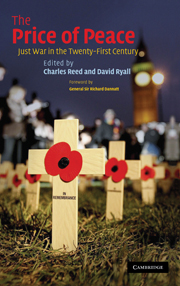Book contents
- Frontmatter
- Contents
- Notes on contributors
- Foreword by Richard Dannatt
- Acknowledgements
- 1 Introduction
- PART I A framework for ethical decision making: state and civil society-based approaches
- 2 The development of just war thinking in the post-Cold War world: an American perspective
- 3 Is there a European approach to war?
- 4 Between development and doubt: the recent career of just war doctrine in British churches
- 5 Just war thinking in recent American religious debate over military force
- PART II Responding justly to new threats
- PART III Fighting wars justly
- PART IV Securing peace justly
- PART V Concluding reflections
- Bibliography
- Index
4 - Between development and doubt: the recent career of just war doctrine in British churches
Published online by Cambridge University Press: 03 December 2009
- Frontmatter
- Contents
- Notes on contributors
- Foreword by Richard Dannatt
- Acknowledgements
- 1 Introduction
- PART I A framework for ethical decision making: state and civil society-based approaches
- 2 The development of just war thinking in the post-Cold War world: an American perspective
- 3 Is there a European approach to war?
- 4 Between development and doubt: the recent career of just war doctrine in British churches
- 5 Just war thinking in recent American religious debate over military force
- PART II Responding justly to new threats
- PART III Fighting wars justly
- PART IV Securing peace justly
- PART V Concluding reflections
- Bibliography
- Index
Summary
The career of the doctrine of just war in British churches since the Second World War has been mixed. In some quarters it has enjoyed revival and development, but in others it has suffered doubt and suspicion. The task of this chapter, then, is to demonstrate past and present growth, to track the roots of current scepticism and to comment on what these imply for the future role of the churches in public debate about peace and war.
The development of the doctrine since the Second World War
During the Second World War just war doctrine was alive in the minds of some prominent members of British churches: for example, the Roman Catholic philosopher Elisabeth Anscombe explicitly employed its criteria in her 1939 essay, ‘The Justice of the Present War Examined’. In the Church of England of this period, however, acknowledgement of the doctrine is harder to find. Traces do appear in the writings of William Temple, Archbishop of Canterbury, when he stipulates that Christians should enter upon war, not out of hatred for the enemy, but only with the intention of restoring a just peace; and when he makes use of the principle of double effect to argue that airmen who aim their bombs at factories and harbours cannot be blamed for any civilian deaths that might result, since these were not directly intended.
- Type
- Chapter
- Information
- The Price of PeaceJust War in the Twenty-First Century, pp. 55 - 75Publisher: Cambridge University PressPrint publication year: 2007
- 1
- Cited by



